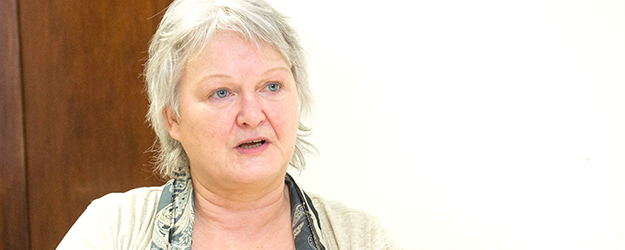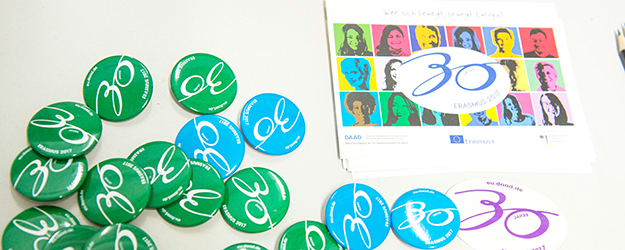25 May 2018
The Erasmus training program was introduced in 1987 by the European Union. Since then, it has promoted the internationalization of the educational landscape on many levels. Erasmus is primarily directed at students. But also teaching staff and other university personnel can benefit from the program. This aspect plays a major role at Johannes Gutenberg University Mainz.
“The exchange option for teaching staff as part of the Erasmus scheme has existed since the program began,” explains Dr. Birgit Weiß. "And JGU has made very active use of this option from the start. The number of teaching staff we have sent abroad through Erasmus has continuously increased - and we have been able to consistently maintain this level.” When it comes to this aspect, the university is among the top group of universities in the old federal states.
In the 2007, the program for staff training was added. "For the first time, it was possible for all university staff to go abroad on Erasmus scholarships. We started with two participants in 2008. Since then, numbers have continued to rise; the concept is becoming more and more popular. At the moment, this part of the program is utilized by approximately 20 people per year.”
Promoting international exchange
Dr. Birgit Weiß in the JGU International Office is responsible for the mobility of teaching staff and university personnel as the Erasmus Institutional Coordinator. When she speaks about her work, it quickly becomes clear how important this subject is to her. "Internationality should long have been on the agenda for every university,” she emphasizes. "Erasmus has been an important and effective tool for advancing internationality for a good three decades now."
Erasmus stands for "European Action Scheme for the Mobility of University Students". As the name implies, the oldest educational program of the European Union started primarily as an exchange program for students in 1987. And this has remained its core task to date. But in addition to this, it offers a wide range of forms of assistance for very different groups of people. Erasmus promotes transnational projects in all educational areas. In addition to students, school pupils, teaching staff and other university personnel also benefit from it.
Whereas Erasmus students generally go abroad for one semester, teaching staff and other personnel go for substantially shorter periods of time. "We generally finance periods of two days up to two weeks,” reports Weiß. "Theoretically, we can extend stays to up to four weeks." There is a very practical reason why these periods are so relatively short. "We want to offer as many JGU members as possible the opportunity to go abroad with an Erasmus scholarship, and this is only possible if we fund short-term mobility projects.”
Building networks
Guest lectureships primarily serve to bring teaching staff in contact with their colleagues abroad. In this way, international networks can be formed. "For example, our people give a block course at one of our partner universities, or join a seminar to teach several units as guest lecturers in order to incorporate specific aspects. In this way, they come into contact with other learning and teaching cultures and can generally expand their horizons.” Conversely, scholarship students then visit Mainz and enrich everyday teaching there.
This exchange works particularly well with universities which already have strong partnership ties with JGU. "Dijon and Glasgow are particularly active in this respect. They do have a lot of interest in the program. Our School of Law alone sends someone to Glasgow every year and we regularly have two guest lecturers in Dijon and up to four in Poland. Here our Department of Slavic Studies is particularly involved through its Mainz Center of Polish Language and Culture.”
However, in recent years, Weiß has become aware of a slight decline in the number of teaching staff applying to go abroad. "This seems to be a general trend in the educational landscape; it doesn’t just apply to us. JGU still occupies a strong third place in this respect nationwide.” Even so, more people could profit from this European program and the funding on offer.
"It is often individuals in the various faculties who decide it might be a good idea to spend time abroad,” clarifies Weiß. "In the case of Economics, for example, two young members of the teaching staff discovered the possibility of using Erasmus for themselves. And they encouraged others to do the same thing. I would be delighted if it were fewer individuals who took the initiative and we could create the appropriate climate here. A stay abroad should simply become the norm and should be a part of faculty culture in the same way as it has become part of students’ everyday lives. And, of course, if we send fewer teaching staff abroad, fewer teaching staff will come to us.”
Advertising for Erasmus
Amongst other university personnel however, the trend is positive all round. "We are seeing an increase in the incentive to go abroad for brief further training or for a language course.” Currently, approximately 20 employees per year take advantage of this offer. "This isn’t just good for the individuals themselves. If, for example, we are planning a joint study course with a partner university, it is of great benefit if our personnel learn more about how the administration there works.” JGU has long offered English courses for its non-teaching staff. "It is clear that it represents an advantage to our internationalization strategy to have personnel with skills in languages other than German. An appropriate on-site course is the ideal supplement to our in-house continuing education program.”
Weiß and the International Office team advertise tirelessly for the Erasmus program. "We want to show people all the potential it offers,” she emphasizes. JGU maintains partnerships with 400 universities worldwide. "We have concluded agreements with most of these regarding teaching staff exchanges. And if someone wants to go to a different university, we can prepare an appropriate agreement for that purpose.”
No contractual agreements are required when going abroad for training. In addition, training can be carried out not only at universities, but also in other institutions. The host merely has to be based in an Erasmus country. Erasmus helps finance a stay abroad by providing a travel allowance and, depending on the country, up to EUR 100 to EUR 160 per day. Teaching staff in particular can design their stay completely in accordance with their interests and the requirements of their faculty at the location.
"We deal with the formal framework arrangements,” Weiß specifies. "There isn’t a lot to do,” she adds in the hope of encouraging potentially interested parties to apply. "The formalities involved are not excessive and can mainly be completed online - and we at the International Office are also available to provide assistance. Just contact us!"



